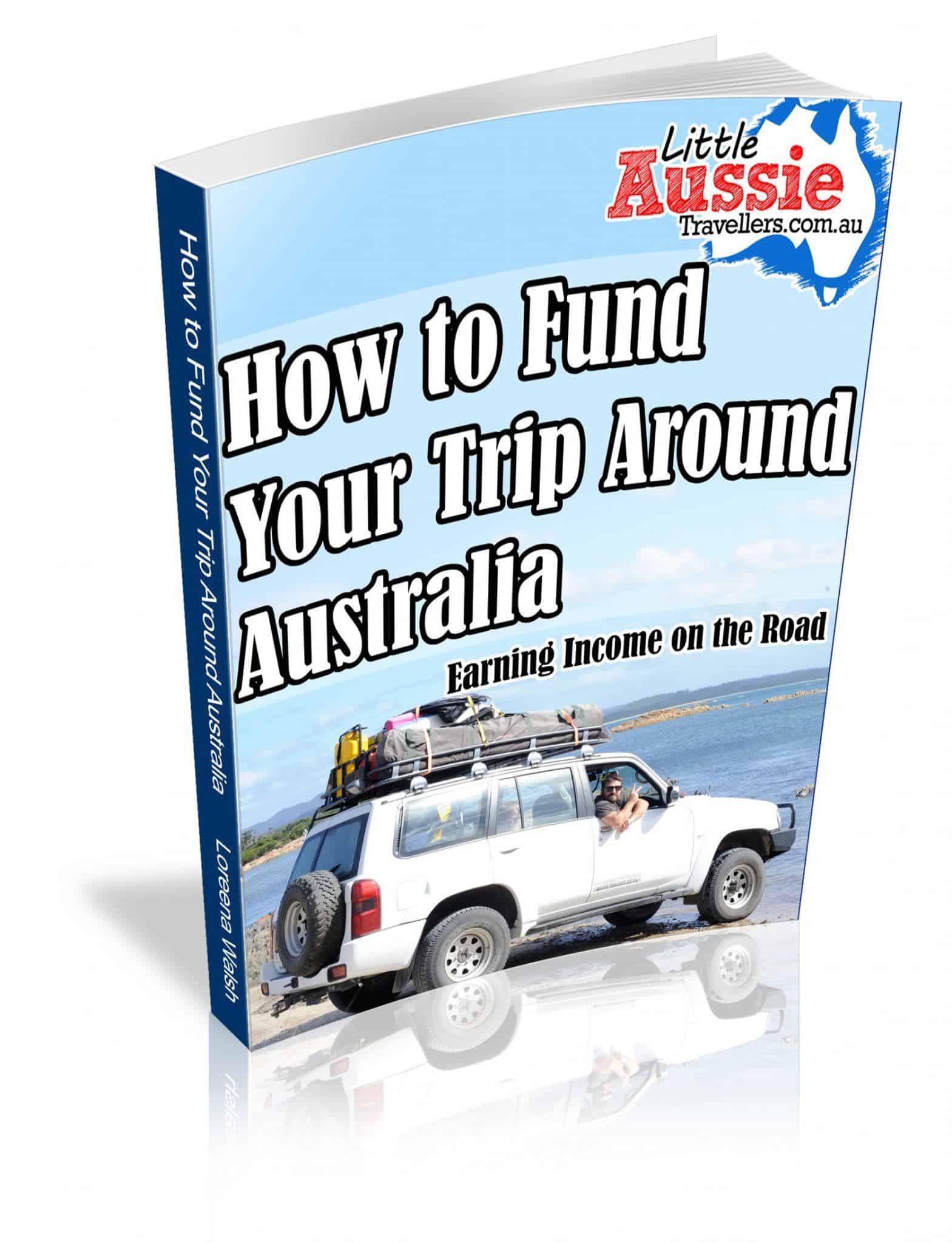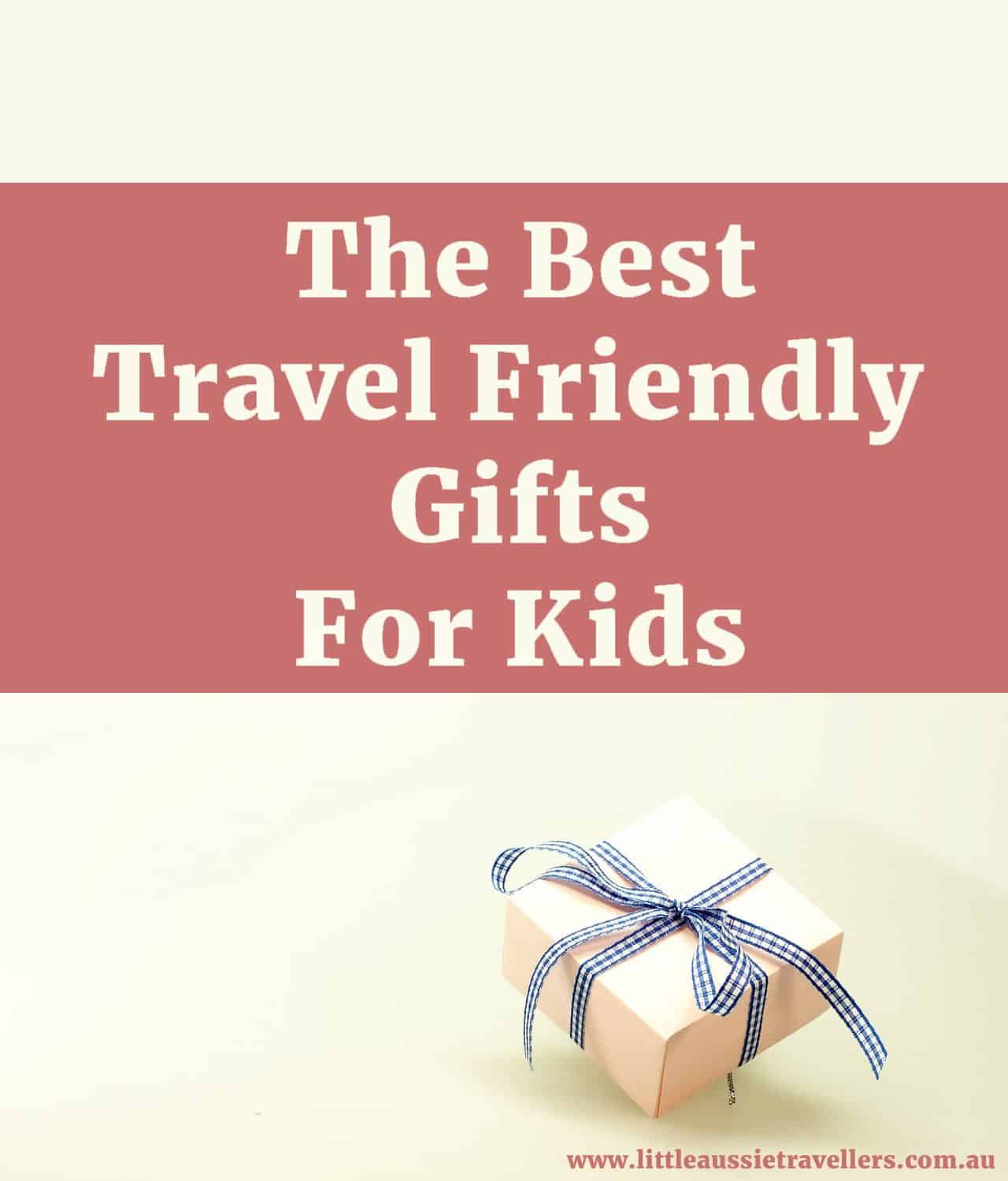
by Loreena Walsh | Australian Travel News, Family Travel, Featured Posts, Gear Guide
There is so much excitement for kids who are heading off to travel, and often friends and family want to buy farewell gifts for kids or their parents to send them off. What many people don’t realise though, is that space is really limited for travelling families, and weight is also a constant juggle – there’s only so much that is legally able to be carried, so buying thoughtful gifts is really lovely, but we’ve got some great tips and ideas for the best travel gifts for kids or families who are about to head off on their trip around Australia.
I’ve decided to update this post for 2019, as now our children are older, things have changed. A lot. Both of my teenagers are now well into skincare & makeup for example, so something for my daughter like a gorgeous Beauty Advent Calendar would be practical and fun. So would I recommend the same gifts for travelling kids as I did when the kids were smaller? Some of them, but there are some other ideas I think are great options, so I’ve added a few more.
We all know there are long car rides, and hours of down time when we’re out on the road travelling, so figet toys are the perfect solution to keep kids occupied.
Fidget toys are generally small, compact and easy to take on the road without taking up too much of your valuable packing space. Brands such as Tangle fidget toys and Speks fidget and manipulative toys for children and adults are such a great solution.
If you haven’t looked at these types of toys for kids, they’re a great option for packing small and light and still having fun activities on the road.
2. Buy A Great Travel Journal for Kids or Adults.
This is still one of the best travelling gifts for kids. It’s actually the perfect travel gift idea for the entire family!.
It doesn’t matter if it’s Mum and Dad, or for the kids; travel journals are the perfect way for travellers to capture all the treasured moments on their journey. From destinations that are loved, to special experiences, drawing pictures, writing stories, sticking postcards, dried leaves, dried flowers, adding photographs. Journals help to create a timeless keepsake that will be a treasured family item for many, many years to come.
One thing I realise about travel, is that while you’re there, in the action, soaking up the landscapes, the conversations, the ever-changing destinations, that you never think you’ll forget. There are parts of our trip that I can barely remember, but having a journal to look back on has ensured that I can re-live the moment, and it’s such a fabulous glimmer of joy reading and remembering the little things that happened along the way that were special to us!
3. Travel-Friendly Art & Craft Supplies.
Whether it’s to write in their journal, help with their schoolwork or send letters and pictures back home to friends and family, travelling kids will love art and craft supplies to take along with them. Watercolour paints are a great option as they aren’t as messy as other paint options and don’t take much to clean up.
Pencils and pens are perfect for writing, drawing and colouring, as are notebooks and writing paper, both of which will come in handy for keeping kids occupied on long journeys and if they want to jot down notes or create artwork to represent their travels.
For our children’s travel journals we began with an A5 folder, with loose inserts from Office Works. That way they could move pages around, add photos once we’d had them printed, brochures, keepsakes, and remove a page if they felt like they didn’t want to include it any more. They also used their art and craft supplies to send special pictures and letters home to family and friends. The gift of stamps is also a great idea if you’d like to receive a postcard from your little adventurers!
4. Binoculars Make Great Travel Gifts for Kids.
Binoculars are a great gift idea for kids who are travelling. The ability to spot things at a long distance will help kids feel immersed in their surroundings and see things they won’t otherwise be able to spot. Wildlife, interesting scenery, they’ll love the faraway goodies they’ll spot through their new binoculars.
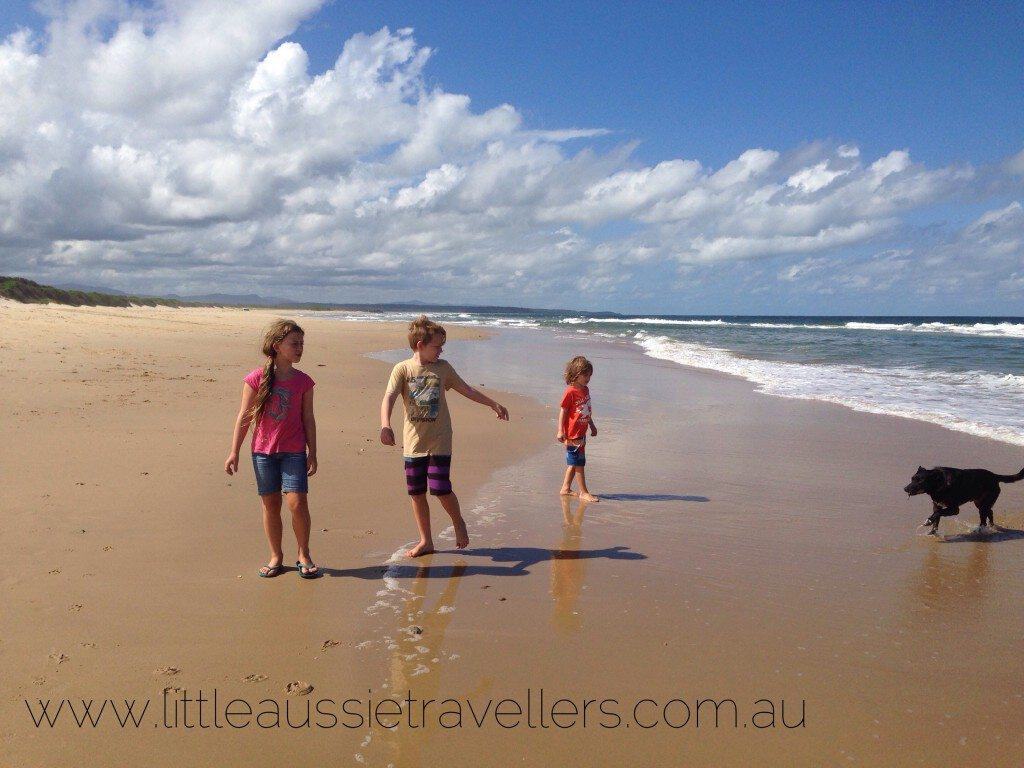
5. Compact & Multi-use Toy Ideas for Travelling Kids
One of the basic toys we considered a must-have when we hit the road was Lego. Not only is it a great toy for building things like we all know, it’s also a wonderful tool for learning maths too! Lego is great for solo play or group play and suitable for kids (and adults) of all ages. Other great ideas include block games like Jenga, the blocks for this game can not only be used to play but also double as building blocks or math blocks too. Marbles, decks of cards, Uno, travel versions of games like scrabble and battleship are all available too. Look for games and toys that are compact or can be taken out of their bulky boxes and easily stored.
6. Tech Gifts for Travelling Families
Depending on the ages of the children, cameras and other tech gadgets can work really well. For cameras, polaroids work well for adding scenic photos or selfies into travel journals, but digital cameras work well for capturing lots of photos and deciding what to print later. Expensive cameras aren’t necessary, just look for something of reasonable quality and the kids will love it. Cameras that are shock proof and waterproof would definitely be an ideal, although more expensive option. Ipods and Ipads are also a much loved travel gadget, as are iTunes gift cards a loved gift for kids who own these devices.
7. Everyday Necessities Especially For Older Children and Teens.
As I mentioned above, now are children are older, I reflect on the things that would make sense for tweens and teens to be gifted for travel. Personal care items are a wonderful gift idea for older kids. I mentioned Beauty Advent Calendars, and my daughter would absolutely adore a gift like this both when we were travelling or now we’re settled down. The bonus is that the items inside are compact in size and great for travelling.
For my son, who now shaves, shave gear, spare razors, cologne, all of this can be expensive to buy on the road in more remote places, so a little gift basket of goodies would be a fabulous idea.
Of course no matter what, gifts that come from the heart are always welcome by any family. When it comes to travel gifts for kids, If you think about items that kids can use, are small, compact and won’t just take up space, you’ll have happy kids and happy parents, and most importantly, happy, smiling travellers!
What about other special events like Mother’s Day gifting, Father’s Day gifting or even Christmas gift ideas for living on the road? We’ll cover those in another post soon.
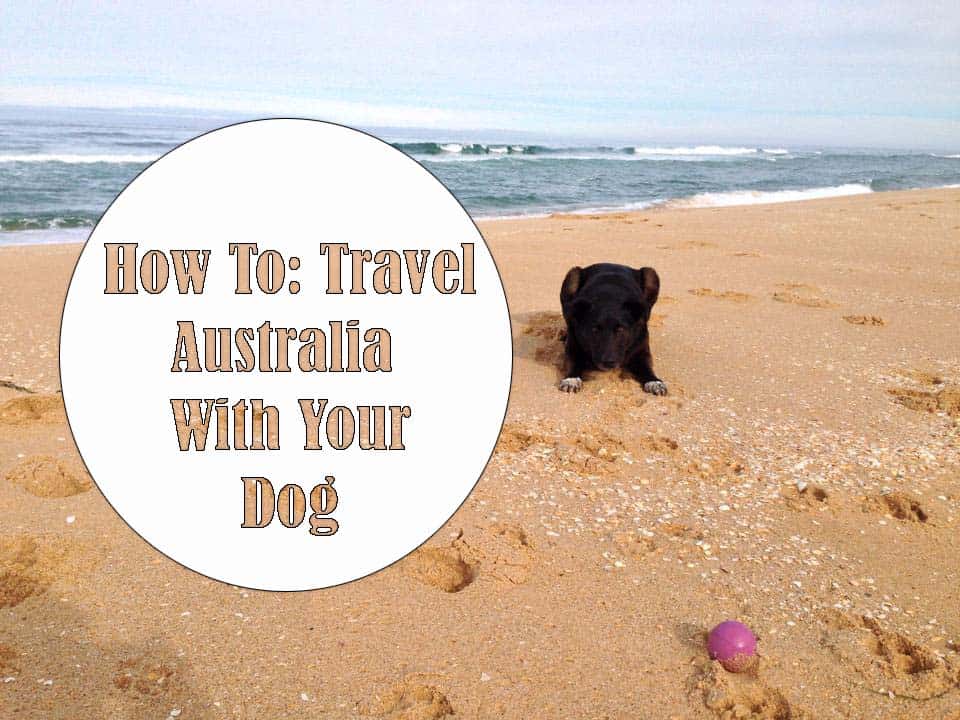
by Loreena Walsh | Travel With Pets
When we first made the decision to sell everything and do the big lap of Australia, we had so many things to consider, pets being one of the most obvious. We wondered about travelling Australia with a dog and if it would be possible to take our mate with us. Travelling with dogs poses a few extra issues and considerations, but we truly couldn’t imagine travelling without our fur-buddy.
Our dog, Yoshi is a Kelpie x Koolie, who happens to think he is human, and about the size of a maltese terrier. I know this because he has been know to try and curl up on the lap of his unsuspecting parents, and believes that whatever is cooked for everyone else should also be on his menu.
So, we couldn’t let Yoshi in on the fact that he’s really a dog, that would have broken his heart, the only solution was to bring him along with us of course!
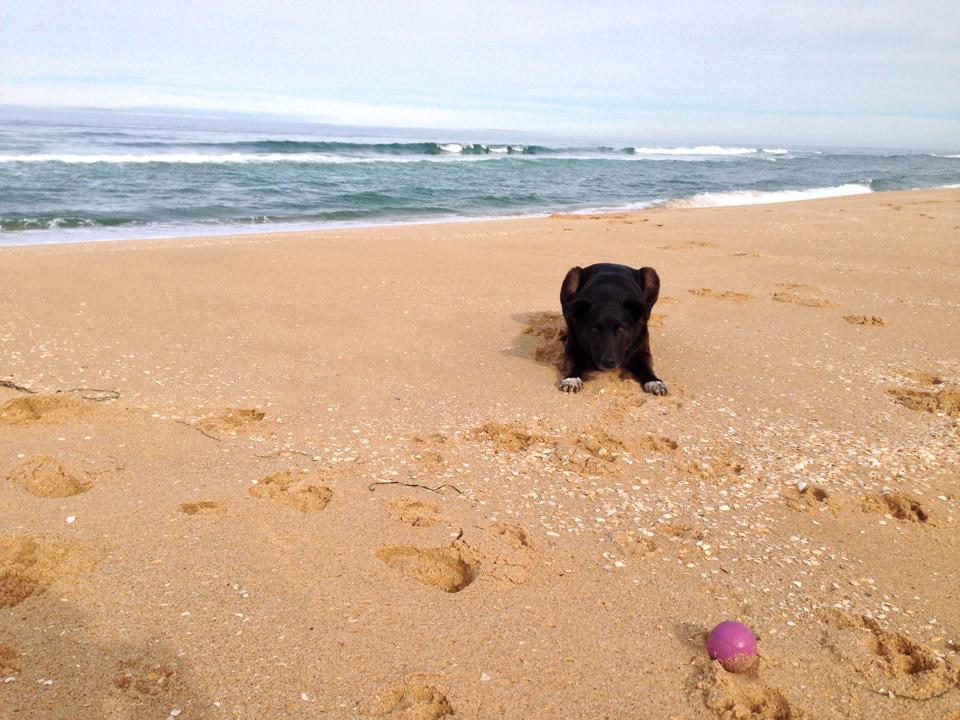
Our cat, lives with my brother and sister in law and their children, and I’ll be seeing him for the first time in 5 months soon, and upon my return I expect to be utterly ignored for the first 24 hours so he can prove to me how much he resents me for leaving him, and how much he loves his new mum (my sister in law), but I know I’ll win out in the end, he loves his mum and knows she feels guilty for leaving him, but she also knows he’s in safe hands (thanks Jo).
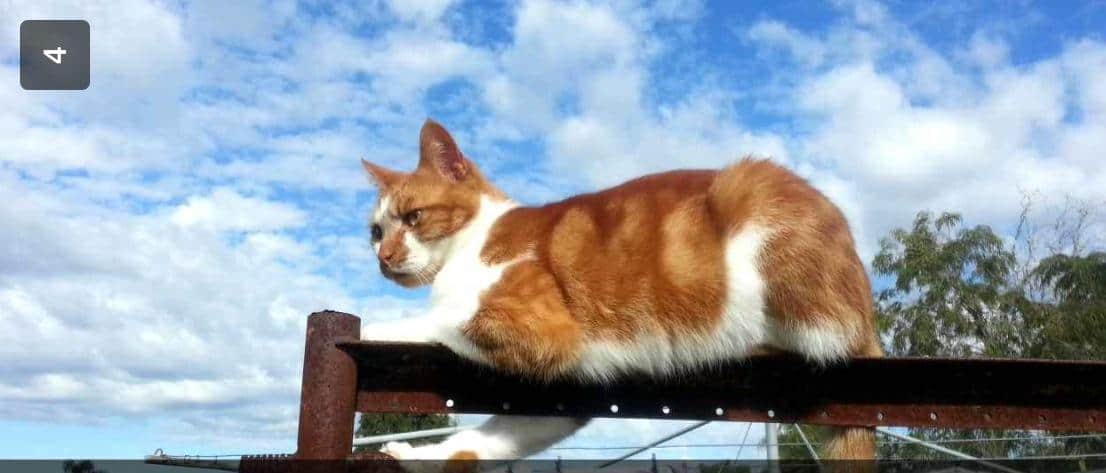
So, back to travelling Australia with a dog. Let’s take a look at how that works for us, and hopefully answer any questions you have.
I remember reading the travel blogs of other people before we hit the road. I could see they were travelling with dogs, but they didn’t give specifics of HOW they were making it work. I wondered about the ins and outs of having a dog with you every day.
Where Do You Leave Your Dog While Doing Activities When Travelling?
If you’ve decided to travel with a canine friend, the day will come that you’ll want to head off and see an attraction, or simply go into the grocery store to stock up on supplies. What do you do with the dog when you need to do important things?
We are really lucky that Yoshi is a very well behaved boy who listens to instructions and is quite happy to sit and wait for us wherever it is he needs to be. When we do small trips, to the shops or into attractions that don’t take long to see, then we generally put him on a lead and leave him tied somewhere safe with a bowl of water and dog food.
Sometimes that means tying him to the car, sometimes that means a nice shady spot out the front or side of the venue. It’s always somewhere safe and he knows when we tell him to “be a good boy we’ll be back” that his time sitting there waiting for us will be short lived.
TIP: Now we’re on the road full time, we rarely go into big shopping centres or other retail centres, purely because we have little need for what they offer and such limited space, that retail therapy isn’t an option. We also shop once a week for supplies, so generally, we’ll visit the grocery store and that will be it. I find that before we were on the road, we were a lot more busy with things like shopping and it would have been hard to always have a dog with us, now, our lifestyle looks much different, and we’re generally out exploring nature, and he’s right along beside us.
Where Should You Leave A Dog Safely For Longer Activities When Travelling?
Sometimes there are activities we want to do that require us to be out and about for the entire day. Obviously, for extended periods of time, it’s not suitable to leave a dog tied up to the car for hours on end. There are a few options we’ve used when wanting to explore which include the following:
Kennels: While we don’t like kenneling Yoshi, because we know he misses us, sometimes there’s just no other option, and at least we have peace of mind knowing he’s safe. We’ve written before about how to find a good kennel for your dog, and luckily we’ve had a couple of options to choose from when we’ve needed to leave him overnight and we’ve always gone with our instinct on good places to leave him.
If you free camp a lot like us, then kenneling can be more expensive than your own accommodation, in fact, in our 3 months in Tasmania, we spent more on boarding for Yoshi than we did on our own accommodation. Be flexible, be sensible and know that it’s going to be part of your travel expenses. We see it as a small price to pay for having him with us to share the journey.
Exchange Pet Sitting: When we were camped near Freycinet National Park in Tasmania, we were so close and yet so far. We knew we couldn’t go into the National Park with Yoshi, and yet, we knew that it was probably the only chance we’d get to see Wineglass Bay during our Tassie trip. Luckily for us, a lovely couple offered to watch Yoshi for a few hours so we could do the trek to the Wineglass Bay lookout.
In return for their kindness, Matt gave them both a haircut, so it was a lovely way to say thanks for their kindness. We’ve had other offers too, to watch him for us, and would do the same for other travellers if the need arises. We’ve also stayed at private low-cost camps, where there weren’t many people around and they’ve let us leave him at the van for a few hours so we could explore. Old Mac’s Farm near Launceston in Tassie was a great example of this.
Other Pet Sitting Options For People Travelling With Dogs
Vets: Quite often you’ll be able to get in touch with vets in the area who often allow you to leave your pet for a short term boarding visit if there’s no other options in the area. We haven’t done this with Yoshi, but we know of other travellers who have done so, it’s definitely worth making a phone call if there’s vets in the area and you have no other options available for pet sitting.
Gumtree: Use Gumtree to do a search for people who offer pet sitting in the region you’re visiting. In some areas you’ll find pet sitters that will take care of your animals in their own home, just like a private boarding kennel option. As always, go with your gut feelings on this, but it’s worth a try.
Some Other Pet Travel Tips For Travellers To Be Mindful Of
- You’ll need to make sure you’re dog’s vaccinations are up to date in order to kennel them,
- You will also need to be aware of any quarantine requirements (I think this really only applies to Tasmania which requires they have their Hydatid Tapeworm tablets within 14 days of visiting.
- Also, we advise keeping a collar and tag on your dog that has your mobile phone number on it. Microchip details are only valid in the state of registration for your animal as far as we’re aware, which means if you lose your dog, when it’s found, it might not be as easy to reunite them with you as it would be at home.
Is It Hard To Travel Australia With A Dog?
The real truth is, that while we wouldn’t change travelling with our dog at all, it does mean we need to be flexible and mindful of our choices. The honesty of the situation is that we do sometimes have to miss out on some National Parks or Conservation areas that don’t allow dogs, and while there’s an ever-growing number of caravan parks and free campsites that allow dogs to stay, it does sometimes limit our options.
If you decide to travel with your pet, you need to be OK with the fact that you might need to re-arrange entire sections of your travels in order to accommodate them. We are on an open-ended trip, so we have time and no real schedule. If you’re on a shorter trip, with limited time, it might be much harder to work around having your dog with you.
When we decided to do a cruise on the Arthur River, for example, we left Yoshi in a kennel that meant we travelled an extra 80km’s or so to come back and get him. But the cruise was definitely worth it and was something we didn’t want to miss out on. We wouldn’t change having our boy with us, he’s a part of our family and he’s relatively easy to travel with, he loves exploring, and he’s a really big fetch addict who makes us lots of new friends no matter where we are, with his big, brown puppy dog eyes sooking at everyone within reach to ppplllleeeeaasssseeeee throw his stick.
If you have ANY questions about travelling with your dog, then please drop us a line, or ask in the comments below……
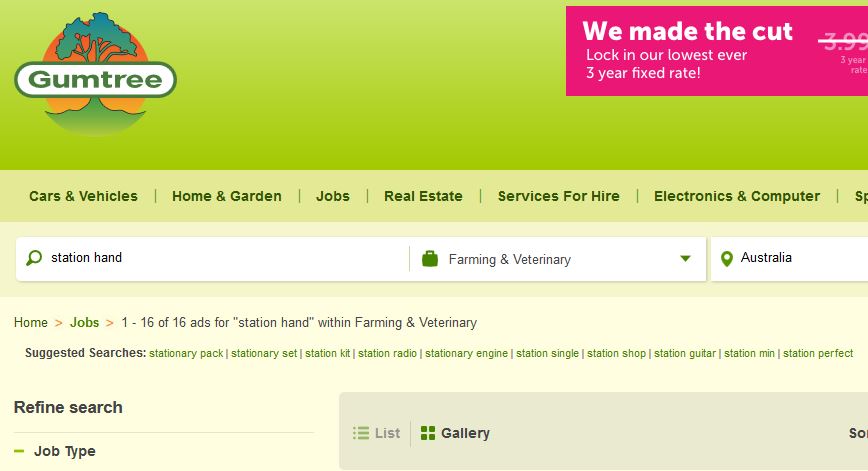
by Loreena Walsh | Income & Finances
So you want to set off on your dream trip around Australia, but to do that you know you’re going to need to work your way around?
Don’t stress; you’re not alone and it’s not as scary to find jobs when travelling Australia as you might think it is.
The Easiest Ways to Find Jobs When Travelling Australia
While there’s no single guaranteed way to find work on your trip around Australia, there are a few ways to make finding a job as easy as possible and keep the money rolling in during your travels.
Word of mouth:
Don’t be afraid to talk to people and ask about work. It doesn’t matter where you are in Australia one of the most proven ways to find a job as you travel is through word of mouth. This works especially well in remote areas or high tourist areas where staffing is made up mostly of itinerant workers. Jobs are not always advertised, so by asking about available work you put yourself in the best position to track down some income.
Chat to shop keepers, the local service station attendant, the bar tender at the pub, locals you meet in the street or at attractions, other campers who might be staying where you are; you don’t have to be on an official job search to find work; in fact casual conversations will surprisingly lead to work opportunities more than you may expect.
Local Facebook Pages:
If you’re on Facebook, it pays to search for local groups for the area you’ll be visiting and join any groups that are work related or similar. Often agricultural positions will be mentioned on Facebook groups or Facebook pages; this can include work such as picking and packing fruit and vegetables, station work, harvest driving, working as a nanny or housekeeper; the options for work are varied and many.
Other than local Facebook pages, there are several major Facebook groups such as ‘Ringers from the Top End’ that cater specifically for agricultural jobs in Northern and remote Australia.

Local Newspaper Classifieds:
While the majority of job searching may be done online, in regional and rural regions the local newspaper employment classifieds will be vital for job hunting. Most newspapers will have online classifieds that accompany their printed versions, but this isn’t always the case and buying the paper will not only support the local economy but there may be extra jobs tucked away inside that aren’t shown online.
Advertise Your Own Skills Online:
This is a hugely underestimated way to find jobs while you travel Australia. One of the most effective ways to find work is to advertise your skills on websites such as Gumtree. Not only do employers advertise their own available employment positions, they also source employees who advertise themselves as available on the site.
List any skills and experience that you have, as well as the kind of work you are looking for, along with what would make you a great employee and where you are willing to travel to. The great thing about Gumtree is that you’re able to easily advertise your skills anywhere in Australia for free, and you can target the region you’d like to travel to next so you can be one step ahead and have work before or not long after you arrive.
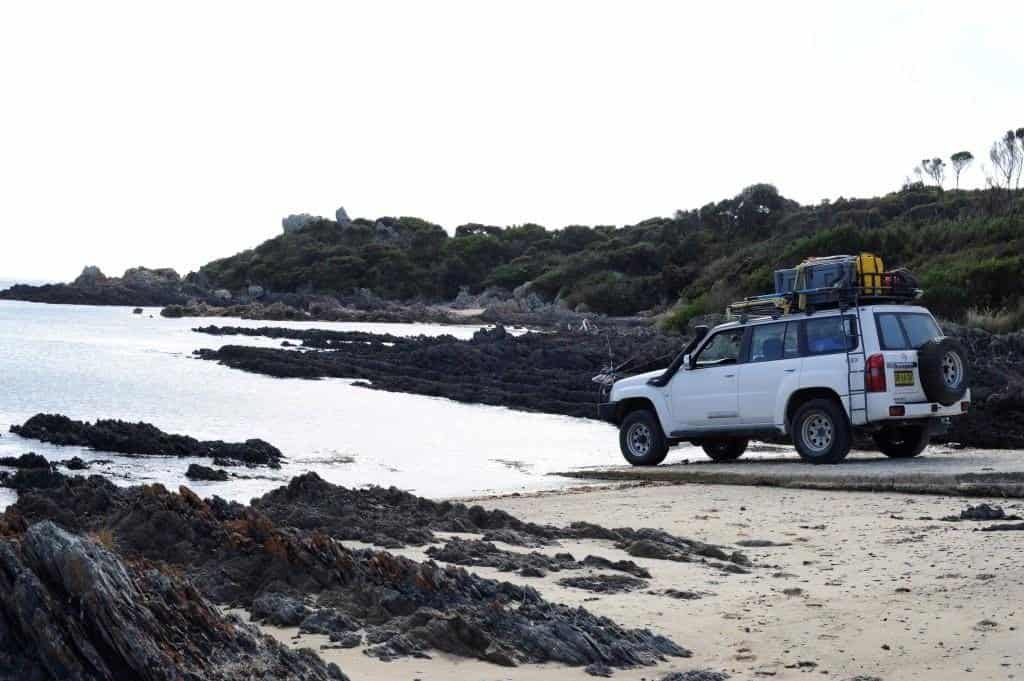
by Loreena Walsh | Vehicle Guide
You know we’re a huge fan of encouraging everyone to get out and about on the open road; or off-road with the kids and the 4WD; it’s the best way to create memories, spend quality time together, reconnect family ties and explore nature.
While taking road trips is fun; it’s also serious; and it’s important you make sure that your 4WD is safe for travel, and you’re prepared in case of a problem. Nobody wants a family holiday memory that involves their family being stuck in the middle of the outback.
Follow these 4WD preparation tips to make sure that nothing dampens your family road trip adventure!
Understanding 4WD Driving Conditions
You may be an experienced driver, but remember that each driving condition requires that you handle your 4WD differently. Also, remember that you will need different 4WD accessories to help you get out of sticky driving conditions. Driving on sand, gravel, or snow all require specific knowledge, and even situations such as driving in high heat while towing will require mindful decisions to be made. If you plan on a trip around the country or even just regular 4wd’ing trips; it’s a great idea to do a 4wd driving course, or even just join the local 4WD club and learn through the knowledge of experienced drivers.
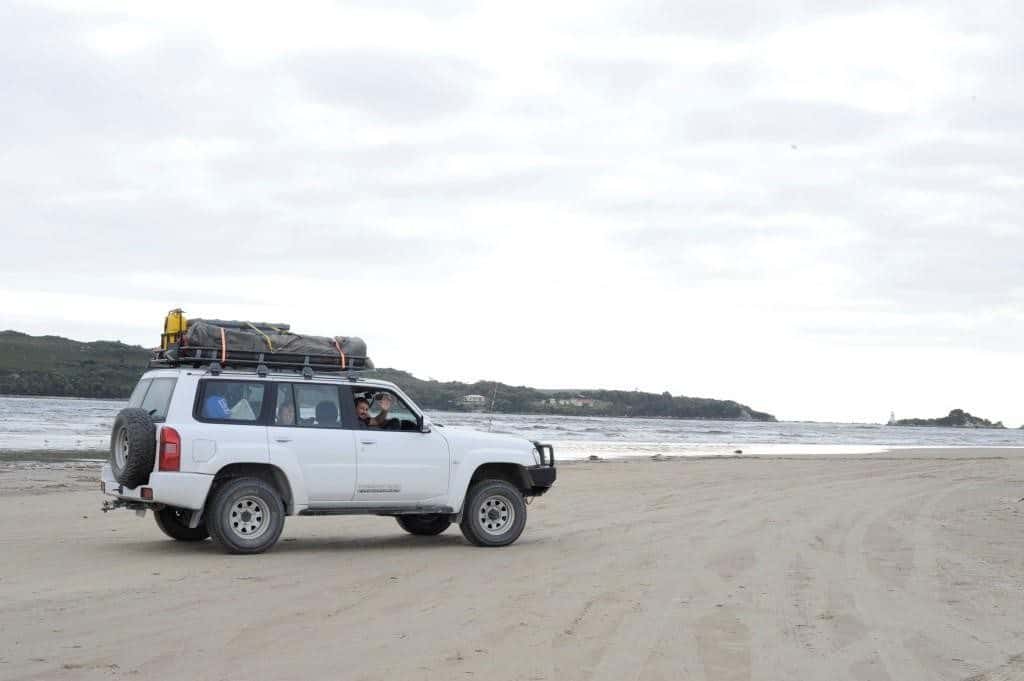
Carry a 4WD Outback Survival Kit
Aside from bringing a first aid kit on your road travels, you will also need to bring your 4WD’s outback survival kit. For example, bringing 2 spare tyres and a spare wheel should be on your list. Recovery tools, plugs, and wheel bearing kits are also useful to have, as is an air compressor. Make sure your gear is rated for use with your 4WD. Many products are suited to smaller cars and 4WD’s often require heavy duty gear due to their size and weight.
Carry a Heavy Duty Air Compressor When Driving a 4WD
The more off-road driving you do, the more you’ll end up using your air compressor. Hence, having a heavy duty air compressor is a must have accessory if you own a 4WD; you never know when you might need to re-inflate your tyres. You may even use the air compressor to inflate camping accessories like inflatable floating devices or an airbed! Having a heavy duty compressor is a must for those with a 4WD. Our patrol runs on light truck tyres and a standard compressor just doesn’t cut it when trying to inflate our tyres, it’s no good carrying a compressor unless it’s right for the job.
Understand & Implement 4wd Preparation for Long Trips
Make sure that you have your vehicle inspected by the 4WD experts before taking it out for long off-road trips. The state of the brakes, the level of fluids and the condition of the oil tank are among those that should be checked. You can also ask your 4WD specialist like Macquarie 4×4 for any advice about the proper accessories and tools you need to bring on your trip. Become familiar with websites that provide information so you know the types of things to look out for; but head to the experts for a thorough safety check.
Carrying Excess Weight Risks Lives & Insurance Validity
4WDs are not trucks. So don’t try to bring everything for your camping trip, otherwise you might end up with an overloaded and broken down vehicle. To avoid this ugly scenario, prioritise bringing the essentials: water, food, fuel, shelter, and clothes. Don’t forget to bring communication devices in case you need to call for help, but aside from that, leave all other gadgets at home and focus on the family trip and the scenery! 4WD’s are often fitted out with accessories that add weight and when people and camp gear are thrown in on top of this, the car actually becomes illegal to drive. Please know your weights; if you don’t, your insurance is likely to be void in case of an accident.
So what are you waiting for? Have your 4WD’s checked and plan your family’s next big camping trip! Don’t forget to share your safety tips with us as well.
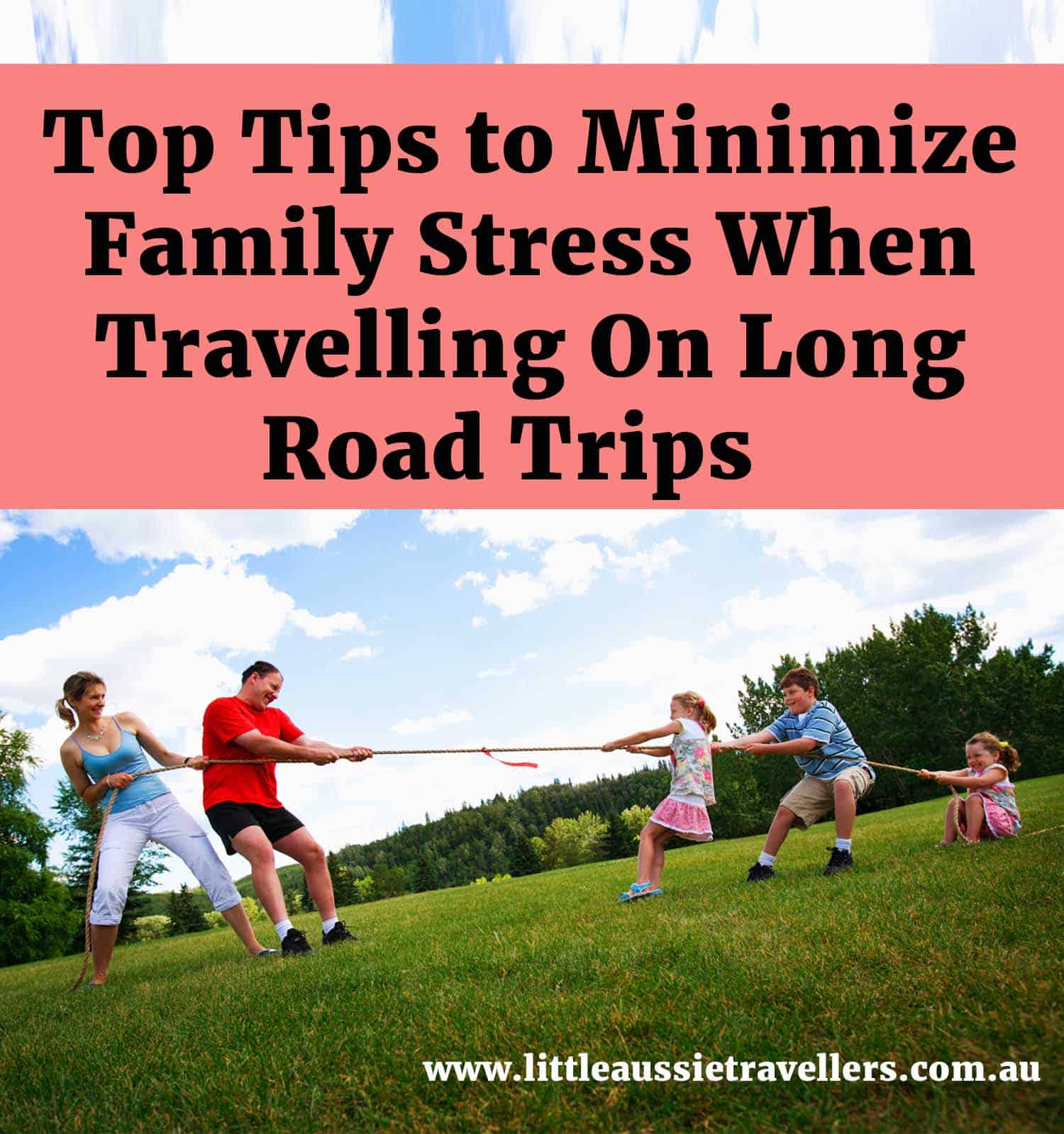
by Loreena Walsh | Family Travel, Featured Posts
We get questions about this all the time. After months, or years of planning for their dream of travelling Australia with kids, the first few weeks of the journey could be described as little more than hellish. Constant fighting, tiredness, kids won’t do schoolwork, adults can’t stand to look at each other, nobody will pull their weight, men are grumpy, women feel unappreciated. Makes you want to plan your family travel around Australia right now doesn’t it?
Possible Causes of Tension for Travelling Families?

Let’s take a look at this shall we? Your entire world has just changed, the kid’s entire world has just changed.
- The environment is constantly changing.
- Nobody knows what the new ‘rules’ are for this new life.
- The accommodation is way more restrictive than a house; there’s no locking yourself away in your bedroom to escape each other.
- There’s packing up and setting up, a stressful experience in itself.
- Hours of driving to get to new destinations.
- Often the family diet goes through some changes.
- Schooling changes to something new & unknown.
- Homesickness happens, especially during tense and stressful times.
- There’s normally restricted ability to relax or tune out activities like watching television or playing video games, because power and electronics are much more restricted when travelling on the road.
- You have to get to really know each other as a family; not just exist together.
- There is NO HIDING from problems that existed before you hit the road.
Do NOT Despair, Family Travel Is Worth The Tough Times!
So, I’ve just shared the most common reasons for why there’s so much tension in your new travel lifestyle, and it may sound overwhelming. If you haven’t left to travel yet, it may be causing you to doubt heading off at all.
I promise, that although your trip around Australia may challenge you as a family; it is going to make you stronger, closer and create memories that will enhance your life in a way that isn’t possible any other way.
We get emails, and questions via our Facebook page asking if other people argue, is it normal, what can be done to fix it, and the answer is YES!
Most people we speak to have suffered the struggle of getting used to their new lifestyle. Generally at the beginning of the adventure, tempers are short, patience is thin, and it seems as though nobody will ever be happy about being on the road, but that just isn’t true.
Arguments are common, frustration is common and a feeling of uncertainty and even regret are all commonly reported by families who are starting their life on the road.
It does get better, and we’re going to take a look at what you can do to make travel as a family less stressful.
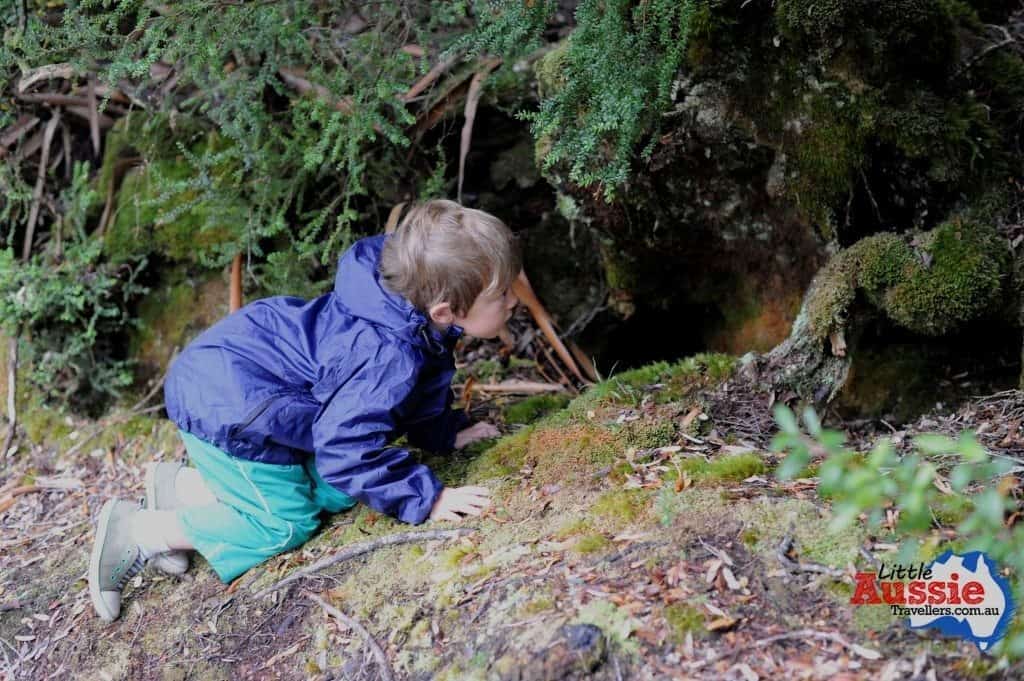
Strategies to Decrease Stress Related to Family Travel
So, now you know it’s ok to stress and feel tension, because truly, it happens to everyone; you want to know how to decrease the problem right?
Here are our top tips for keeping things stress free and happy on the road:
Allow at least 4-6 weeks to settle in to your new lifestyle. Adjustment takes time, and it’s OK if everything doesn’t feel perfect right away.
Find a nice place and stop for a while. The faster you move, the more stressful your travel is likely to be. If things are feeling tense, then find a lovely campsite and stop. What are you rushing for anyway? This time is meant to be spent bonding, getting to know each other better and enjoying your surroundings. Rushing helps no-one, so take in the surrounds, do some exploring and put some roots down for a short while; it can make all the difference.
Join in happy hour. For parents on the road, it can seem a constant battle to maintain healthy adult relationships. Get dinner sorted early, or have something easy, that way when all the child-free travellers are enjoying happy hour together (which normally happens around family dinner time in campsites) you’ll be able to join in too and share stories.
Talk it out! Unlike life at home where everyone could disappear into their own world, life in a camper or caravan doesn’t allow for dodging confronting emotions. Get things out of the way, sit down and talk honestly about what’s irritating you, how everyone else feels and make a plan to move forward feeling positive.
Have some alone time: This one can be tough, but if you like to read, make some time to do that. Like to visit the shops and there’s some handy then do a solo shopping trip. Go for a short walk, have a swim, whatever it is that will give you some inner peace, make time for it. This is really where parents need to work together to give the other time for a break. It really does make all the difference with being able to handle the more stressful events that travelling will throw at you.
Cut each other some slack: We all go into travelling with expectations of what it will be like and how ‘it’ will look. Chances are actually being on the road may look very little like your imagined trip of a lifetime. That is OK! Breathe, relax and let everyone find their sweet spot for travelling. If your children are older they may be missing friends, cut them some slack, let them call to say hi. If school work seems to do little but spark arguments, take a couple of days off, resentment won’t achieve anything positive anyway.
Be Flexible: This is possibly the most important tip of all. Travel should be about adventures and togetherness, not strict schedules and deadlines. Learn to be flexible, if everything isn’t perfect it doesn’t matter, if you’re late it doesn’t matter, if you need to stay an extra day or three somewhere it doesn’t matter. Let go of your preconceived ideas and enjoy what is, because it will be over before you know it.
Do you have any tips for easing stress for long term travel? Did you have a bumpy start?
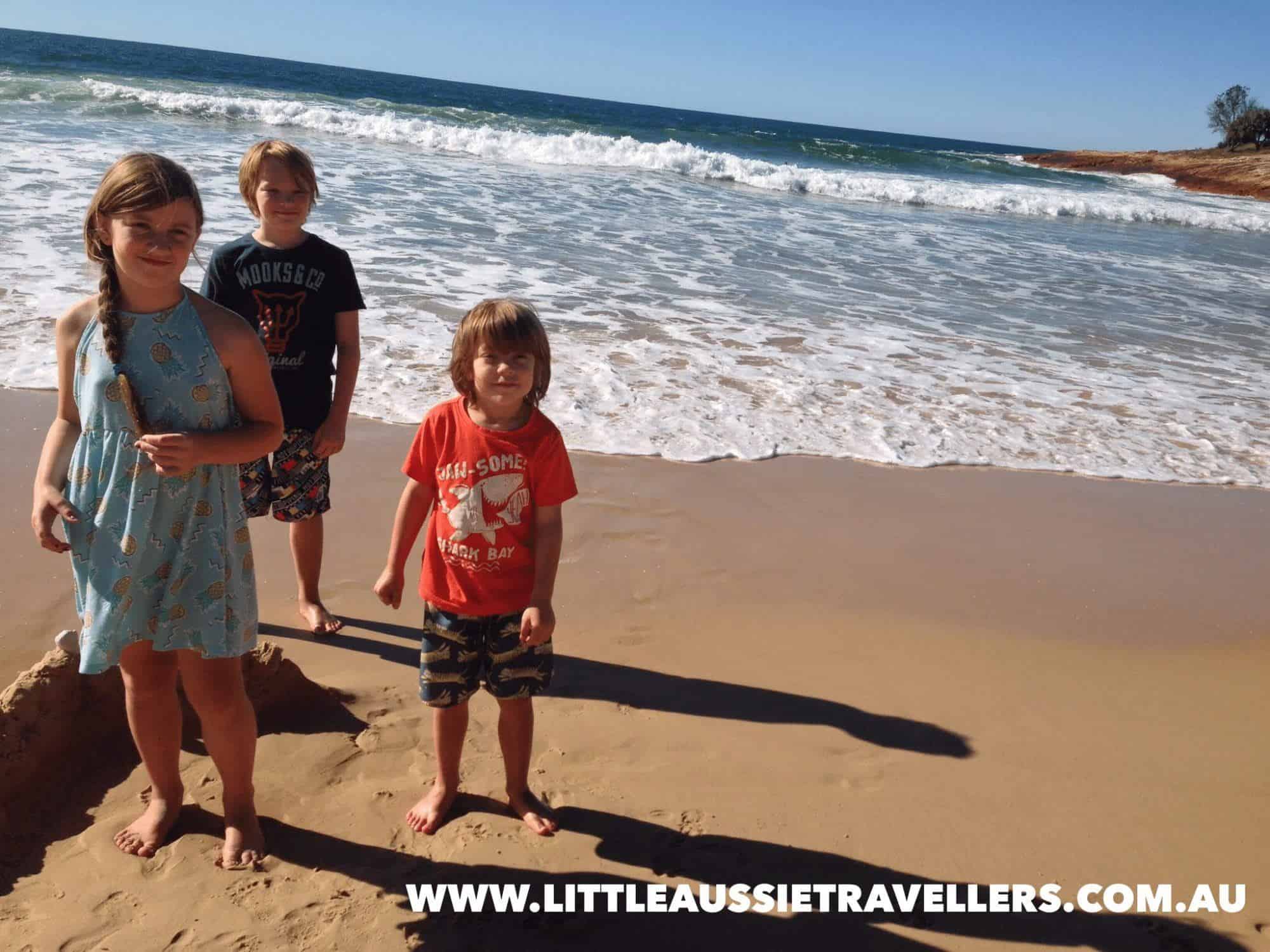
by Loreena Walsh | Family Travel
One thing we get asked a whole lot is what is the best age for kids to travel Australia on a family road trip?
Our answer to anyone is: Go the very second you can!

But, of course, life’s not always as simple as that, is it? Having your children out exploring Australia at any age, is an enriching experience for the entire family, no matter the age or length of time, getting out on the road, sharing unique adventures with your kids is truly a life-changing opportunity.
That being said, here’s some of the biggest considerations for when you should head off on your big lap of Australia and our thoughts, which have changed since we originally began planning, hit the road, and then became stalled again:
How long are you planning to travel Australia, and what suits kids?
The length of time you want to head off on the road can impact the best age for your child to go on your Aussie adventure. If you’re only doing a short trip and need to move quickly in order to see a whole lot, then you’ll need to consider how well your children will travel.
For younger children, being stuck in a car seat for hours on end can be really frustrating and it’s hard to communicate as a parent that you’ll arrive soon. Young children just want to move and play.
You know how much travel time your children can cope with, and go with what suits your child. Ours were doing 5 hour car trips from the time they were born; as we’d often go and visit family. As people moved further away, that stretched into 7-8 hour car trips, but I know lots of kids who would never have coped with that (as well as some parents who would have considered a trip that long their worst nightmare).
Slow travel means you can break travel into shorter distances, making it a little easier for everyone.
How much do you want to see during your Aussie Road Trip?
If you’re wanting to take in the entire country in just a matter of months, this is likely to end up a stressful experience no matter the age of the kids. In our experience, taking quality time to see fewer things is a better recipe for family travel success!
Our first ever long trek, we knew we had 3 weeks, a hire car and a tent. We also knew we wanted to see Central Australia, and so we travelled from Darwin, through Kakadu and down the centre to Adelaide over a three week period when the kids were aged 18 months, 3 and 5. They were all good travellers and although we were moving pretty quickly, they coped well with it. That pace wouldn’t have been sustainable for longer travel, but it worked well to get a taste of adventure.
Knowing how long you’ve got, and how much you want to see, it pays to make certain areas or landmarks a priority and focus your travels around these places.

What Type of Accommodation are you Travelling With?
Is your accommodation cozy and child friendly? There are families out and about in tents, camper trailers and caravans and other options too, but your type of accommodation may affect your child’s comfort and stamina for travel.
While the Jayco Swan was a good choice, and I’d use one again for shorter trips; for us it became awkward for our children to share the queen bed together and we knew that it wasn’t going to be a viable long-term solution, and so bunks in a caravan became our goal.
Comfort definitely plays a role in how well the entire family copes with the travel process, and budget options are awesome, and great, it’s better getting out and exploring than not at all, so it shouldn’t be a deterrent but it should be a consideration for what your children will cope with.
What is your Travel Goal?
Why do you want to head off? Is it for freedom, to leave behind an unhappy job, to take a short break, do discover a new region to settle down in? Knowing your goal and what you hope to get out of the process, will help guide you when deciding if your children are at the right age to undertake that goal achieving travel with you.
Life is Meant to be an Adventure!
It doesn’t matter what you decide, how old your kids are, how far you get, how many places you do or don’t see, the entire process and journey is meant to be a wonderful adventure. It is not going to be a perfect adventure. Things will go wrong. Things will be amazing. Things will be stressful. Things will be awesome and unforgettable.
Just like most things in life, there’s never a perfect time, other than this very moment we’ve been given to make the most of the time we have.
Happy travels, comment below if you have any questions or drop us an email!




















